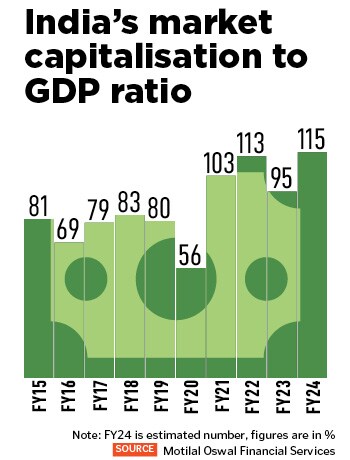
Will stock markets stay high in 2024?
As stock markets will navigate through general elections, inflation and various economic conditions, where will investors park their money in 2024? Will markets snap the gaining streak?
 Indian markets have been on a gaining spree in last two months while the five state election results have further boosted sentiments, calming down jittery investors.
Image: Shutterstock
Indian markets have been on a gaining spree in last two months while the five state election results have further boosted sentiments, calming down jittery investors.
Image: Shutterstock
Even as investors are betting on Indian stocks for higher returns in 2024, there is also a growing sense of caution due to the nervousness around the general elections in May and a widening inflation that may hit the overall cost of capital. Despite volatility and weakness in the first half of the year due to multiple factors such as geo-political crises, the rise in the bond yields and commodity prices increase, Indian markets are closing 2023 with healthy returns.
The party is expected to continue in 2024 as well, at least in the first quarter of the year. “We continue to remain quite positive on the Indian equities,” says Rupen Rajguru, head of equity, investments and strategy, Julius Baer India. He explains that the scenario has turned quite positive in the past couple of days with the US Federal Reserve holding interest rates, signalling an end to the rate hike cycle and adopting a pretty dovish stance, leading to softening of US bond yields and dollar index.
“This is a perfect recipe for a risk-on environment and revival of flows to equities, especially emerging market equities. The Indian markets have got a further booster dose in the form of a favourable outcome in the state elections, to some extent addressing an impending political uncertainty,” he adds.
According to him, investor money will continue to chase asset classes generating returns and where there is decent visibility. In the Indian markets, equities have clearly emerged as one asset class, which has delivered robust returns, and with a positive set-up and healthy outlook, it will continue to be the preferred investment destination for Indian investors, he explains.
Indian markets have been on a gaining spree in last two months while the five state election results have further boosted sentiments, calming down jittery investors. Markets have overall gained 17 percent since January after a turbulent phase.



 An optimistic Ashutosh Bhargava, fund manager and head, equity research, Nippon India Mutual Fund, feels that as we enter 2024 there are many good news on growth, inflation, and the US Fed pivot and earnings front, but valuations have also rerated meaningfully. “While there is less nervousness and more comfort now, the return expectation has to turn moderate. 2024 returns are unlikely to be as broadbased and strong as 2023 but still equities may not disappoint if return expectations are close to 10-12 percent,” he says.
An optimistic Ashutosh Bhargava, fund manager and head, equity research, Nippon India Mutual Fund, feels that as we enter 2024 there are many good news on growth, inflation, and the US Fed pivot and earnings front, but valuations have also rerated meaningfully. “While there is less nervousness and more comfort now, the return expectation has to turn moderate. 2024 returns are unlikely to be as broadbased and strong as 2023 but still equities may not disappoint if return expectations are close to 10-12 percent,” he says. 



